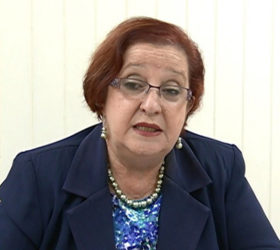The long delayed Local Government Commission (LGC) is no closer to being realised as both government and opposition have made no steps to resolve a stalemate over its composition.
In February, opposition Chief Whip Gail Teixeira had told Stabroek News that the PPP was willing to humour Minister of Com-munities Ronald Bulkan and convene a consultation with all parliamentary parties to receive suggestions of nominees for the LGC. However, last Thursday Teixeira seemed less than enthusiastic about this process, saying instead that she was not in a position to decide the date.
She also noted that her party has in the last few weeks been concerned with more important and pressing matters, such as the identification of the Chairman of the Guyana Elections Commission (Gecom) and the operations of the Special Organised Crime Unit.


Bulkan has for months maintained the LGC will be operationalised once Leader of the Opposition Bharrat Jagdeo states whether he satisfied the requirements of the legislation and “consulted with all parliamentary parties” when deciding on the names he submitted as commissioners. The minister has maintained this position despite the opposition having claimed to have submitted a response to this query in July, 2016.
“If it is our fault, we’ll convene a meeting and listen to all parties but the discretion still remains with the Opposition Leader to select his nominees,” Teixeira had explained in February, while noting that the process will be similar to the consultations held to identify nominees for the Chairman of Gecom.
Teixeira had also stated that once this consultation is held, she would like to hear from Minister Bulkan why he has not issued a commencement order, convened a meeting with the Local Government Authorities (LGAs) or announced the President’s three nominees.
However, Bulkan, when approached by Stabroek News last Friday, could not give answers to any of these questions.
Asked about consultation with the 71 LGAs for their nominee, Bulkan said that “some engagement has taken place but there will probably be a need for more.” Though asked he did not state what form these engagements have taken or will take. He also would not provide a timeline for these consultations.
As it relates to the President’s nominees, Bulkan would only say that they are “still a work in progress.”
Last July, Leader of the Opposition Bharrat Jagdeo identified former George-town town clerk Carol Sooba and former local government ministers Norman Whittaker and Clinton Collymore as his three nominees for the commission.
Three months prior, the National Assembly’s Committee of Appointments named Andrew Garnett, of the Guyana Local Government Officers’ Union, as the nominee of the trade unions. This nomination was approved by the House in August.
According to the legislation, the commission will be made up of eight members: three nominated by the president, one nominated by the minister after consultation with the 71 LGAs, one nominated by unions operating in the local government sector and three nominated by the Leader of the Opposition after consultation with all parliamentary parties.
The PPP/C has construed the consultation with all parliamentary parties to be applicable only if there were multiple opposition parties. There is only one – the PPP/C – and therefore, according to Teixeira, the only other party to be consulted would be the governing APNU+AFC. It appears to be a case of a badly drafted law as it is not thought that the Leader of the Opposition should have to consult with the governing party about his nominees to the LGC. Bulkan has, however, insisted that this be done.
Though Bulkan has for months maintained that the government has a shortlist of suitable candidates under consideration, their names remain a mystery.
He told the National Assembly in November that the administration was consulting as it was “being exceedingly careful that its nominees can meet the test of the legislation.” Before becoming minister, Bulkan had been critical of his PPP/C predecessor Norman Whittaker for not moving to operationalise the commission. His party, APNU, had also called numerous times for the commission to be established.
Further, one of the AFC’s key demands for its support of anti-money laundering legislation in 2014 was the signing of the commencement order for the Act to take effect.
Since winning the May 11, 2015 elections, however, the APNU+AFC government has not moved with alacrity to establish the body.
The commission is provided for in Guyana’s Constitution. Article 78 (a) reads: “Parliament shall establish a Local Government Commission, the composition and rules of which empower the commission to deal with as it deems fit, all matters related to the regulation and staffing of local government organs and with dispute resolution within and between local government organs.”
The Bill to enable the establishing of the Commission was passed in the National Assembly in August 2013 and in November that year received presidential assent. However, a Commencement Order to be issued by the minister is required for it to be brought into effect.
The commission’s functions, outlined at Section 13 (1) of the Act says it shall have power to deal with all matters relating to the regulation and staffing of local government organs including employment and dismissal of staff and with dispute resolution within and between local government organs, and in particular, shall monitor and review the performance and implementation of policies of all local government organs, including policies of taxation and protection of the environment.
It also has the power to monitor, evaluate and make recommendations on policies, procedures and practices of all local government organs in order to promote effective local governance; investigate any matter under its purview and propose remedial action to the minister, whenever or wherever necessary; monitor and review all existing and proposed legislation, and or policies and measures relating to local government organs and to make recommendations for any legislation or any amendments to any legislation and or policy to the minister; and examine and propose ways of enhancing the capacity of local government organs.
The commission will oversee not only municipalities and Neighbourhood Democratic Councils but also Regional Democratic Councils as well as Amerindian villages.





